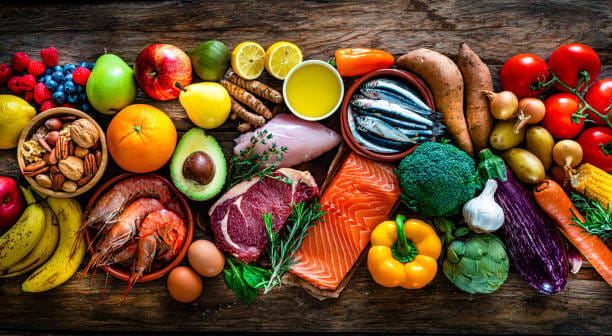What is the Primal Diet?
At its core, the Primal Diet is a return to the way humans were meant to eat—focusing on whole, nutrient-dense foods that nourish the body while eliminating processed, inflammatory, and unnatural ingredients.
It’s based on the dietary patterns of our hunter-gatherer ancestors, who thrived on a variety of animal and plant foods for millennia. Unlike today’s ultra-processed Western diet—laden with refined grains, sugars, and industrial seed oils—the Primal approach aligns with human physiology to support long-term health, energy, and longevity.
To put it simply: Eat plants and animals and eliminate grains, added sugar (and sugar-sweetened beverages), and refined vegetable oils.

The Purpose & Premise of the Primal Diet
The modern world has introduced countless conveniences, but it has also disconnected us from the foods that fuel optimal health. The Primal Diet is designed to:
✅ Prioritize Whole Foods – Eating animals and plants in their most natural, minimally processed forms.
✅ Eliminate Harmful Foods – Cutting out grains, added sugars, and industrial seed oils that disrupt metabolism and trigger inflammation.
✅ Align with Human Biology – Providing the essential vitamins, minerals, and macronutrients required for energy, digestion, and cellular function.
✅ Simplify Your Nutrition – Make eating healthy easy again
This way of eating isn’t about strict historical replication but rather inspiration—taking cues from ancestral eating patterns while integrating the best of modern nutritional science.
What to Eat on the Primal Diet
Animal-Based Foods (Nose-to-Tail Nutrition)
Meat – Grass-fed beef, lamb, pork, bison, and game meats
Fowl – Pasture-raised chicken, turkey, duck, and other poultry
Fish & Seafood – Wild-caught salmon, sardines, mackerel, anchovies, shrimp, and shellfish
Eggs – Pasture-raised or omega-3-enriched eggs
Plant-Based Foods (Nutrient-Dense Carbs & Fiber)
Vegetables – Leafy greens, cruciferous veggies, root vegetables, and colorful produce
Fruits – Berries, citrus, apples, bananas, and seasonal options
Tubers & Roots – Sweet potatoes, carrots, beets, parsnips
Nuts & Seeds – Almonds, walnuts, macadamia nuts, flaxseeds, chia seeds
Herbs & Spices – Basil, turmeric, cinnamon, ginger, rosemary
Unlike restrictive diets that count macros, the Primal Diet naturally balances protein, fat, and carbohydrates based on real, whole foods—allowing flexibility to match personal health goals.
Foods to Avoid (Metabolic Disruptors & Inflammatory Triggers)
The Primal Diet eliminates modern foods that contribute to inflammation, gut dysfunction, and metabolic disorders. These include:
🚫 Grains – Wheat, rice, oats, corn, and all grain-based products (bread, pasta, cereal, etc.)
🚫 Added Sugars & Sweeteners – High-fructose corn syrup, refined sugar, artificial sweeteners
🚫 Industrial Seed Oils – Canola, soybean, corn, sunflower, safflower, and vegetable oils
These foods have been linked to chronic disease, insulin resistance, and systemic inflammation, making their removal a key pillar of the Primal lifestyle.
Mythbusting the Primal Diet
💡 Myth #1: It’s Just a Meat-Heavy, High-Protein Diet
Not true! While the Primal Diet emphasizes high-quality animal protein, it also includes an abundance of vegetables, fruits, nuts, and seeds. Ancestral diets varied based on geography and season, with some populations relying more on plant-based foods and others on animal sources.
💡 Myth #2: It’s a Strict Low-Carb or Keto Diet
The Primal Diet doesn’t require low-carb eating—it simply eliminates processed carbs. Whole-food carbohydrate sources like sweet potatoes, fruits, and root vegetables can be part of a Primal lifestyle, depending on personal needs and activity levels.
💡 Myth #3: It Tries to Replicate Caveman Eating
The goal isn’t to eat exactly like our Paleolithic ancestors. That’s impossible. Instead, Primal eating is about making intentional choices—prioritizing seasonal, local, whole foods while avoiding processed and inflammatory ingredients.
Bringing It All Together: The Modern Primal Lifestyle
The Primal approach is more than a diet—it’s a holistic philosophy that extends beyond food. It includes:
✔ Prioritizing movement – Functional strength training, walking, sprinting, and play
✔ Getting sunlight & fresh air – Supporting circadian rhythm and Vitamin D levels
✔ Managing stress – Mindfulness, breathwork, and nature exposure
✔ Optimizing sleep – Natural light exposure, tech-free evenings, and a cool, dark sleep environment
By eating, moving, and living in alignment with our biology, we unlock greater energy, vitality, and longevity—without unnecessary restrictions or gimmicks.
Ready to Go Primal?
Shifting to a Primal Diet and lifestyle can be a game-changer for energy, metabolism, and overall well-being. It’s not about deprivation—it’s about nourishing your body with real food and living in a way that supports your long-term health.
P.S. Want to take your health to the next level? Get my 21-Day Transformation Challenge for 75% off—now just $24.99.
